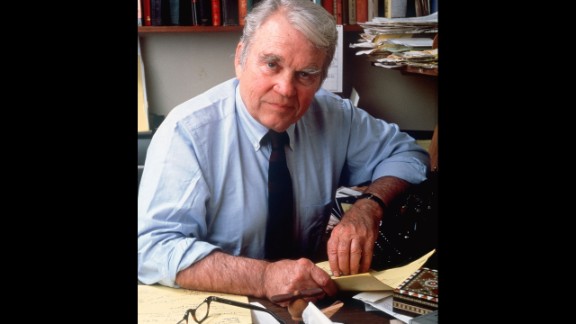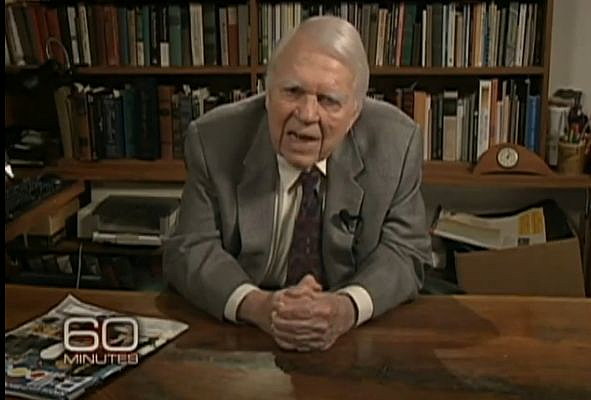

That fall, Rooney began alternating weeks with the two verbally sparring journalists, winning an Emmy for his essay titled “Who Owns What in America,” in which he visited Mrs. The “rumpled pragmatist with a dry wit and a salty acerbic style” - as former Times television critic Cecil Smith described Rooney - first appeared on “60 Minutes” in 1978 as the summer replacement for “Point Counterpoint,” the brief, end-of-the-show segment featuring liberal Shana Alexander and conservative James J. “If I want home cooking,” he said, “I’ll stay home.”) (If a restaurant menu has a tassel on it, Rooney told viewers, “add $2 to the bill.” And forget restaurants advertising home cooking. Rooney Goes to Dinner,” in which he explored the $11-billion restaurant business by visiting restaurants across America, was one.
Andy rooney once said series#
And, thank God, we’ve had the opportunity to let millions of Americans see him every Sunday night for the last couple of decades,” said Wallace.Īn award-winning writer and producer of CBS News TV specials narrated by Harry Reasoner in the 1960s - “A Birdseye View of America” and “An Essay on Bridges,” among them - Rooney began appearing on camera himself as the writer-producer of a series of specials in the ‘70s. He’s got the guts to say what is on his mind. “I have never, never come across a man I admire more, respect more,” Wallace said during a discussion of journalism in World War II at the Smithsonian Institution in 2004. With Rooney, as his “60 Minutes” colleague Mike Wallace once said, “What you see is what you get.” “The French lost World War II to the Germans in about 20 minutes.”
Andy rooney once said license#
“You can’t beat the French when it comes to food, fashion, wine or perfume, but they lost their license to have an opinion on world affairs years ago,” he said. In 2003, for example, he turned his attention to the French for failing to support the war in Iraq. There are certain names they’d never use, ‘Bankorama,’ for instance.”īaseball: “My own time is passing fast enough without some national game to help it along.”īut Rooney didn’t just spend his few minutes on seemingly trivial matters. Seated behind his desk in his small, cluttered office at CBS in New York, Rooney spoke into the camera as though the viewer at home had just dropped in for a brief visit to see what was on his mind that week.ĭesigner jeans: “The facts of the advertising greatly exceed the fact of the average American posterior.”īank names: “Trust is a word banks like in their names. Those are just some of the words journalists have used to describe the man TV Guide called “America’s favorite grump.” Viewers of the award-winning TV newsmagazine who saw him as a friend, neighbor or relative knew what to expect from the man who offered his opinions on a broad array of topics. He died at a New York City hospital of complications following minor surgery, according to CBS.įor millions of Americans, Rooney was a welcome visitor into their homes on Sunday evenings, an old familiar face appearing for a few minutes at the tail end of one of the most highly rated programs in television history. 6 Section A said that Rooney was asked by a USA Today reporter in January about retiring and replied: “Retire? From what? Life?” Rooney made the comment in January 2010.


He was 92.ĬBS announced the death of Rooney, who launched his long career during World War II as a correspondent for the Stars and Stripes military newspaper and continued to be a fixture on “60 Minutes” for 33 years.Īndy Rooney: The obituary of TV commentator Andy Rooney in the Nov. Andy Rooney, CBS News’ longtime resident curmudgeon whose whimsical and acerbic essays on “60 Minutes” turned the rumpled writer into an unlikely - and reluctant - TV celebrity, died Friday night, only weeks after retiring from the show.


 0 kommentar(er)
0 kommentar(er)
